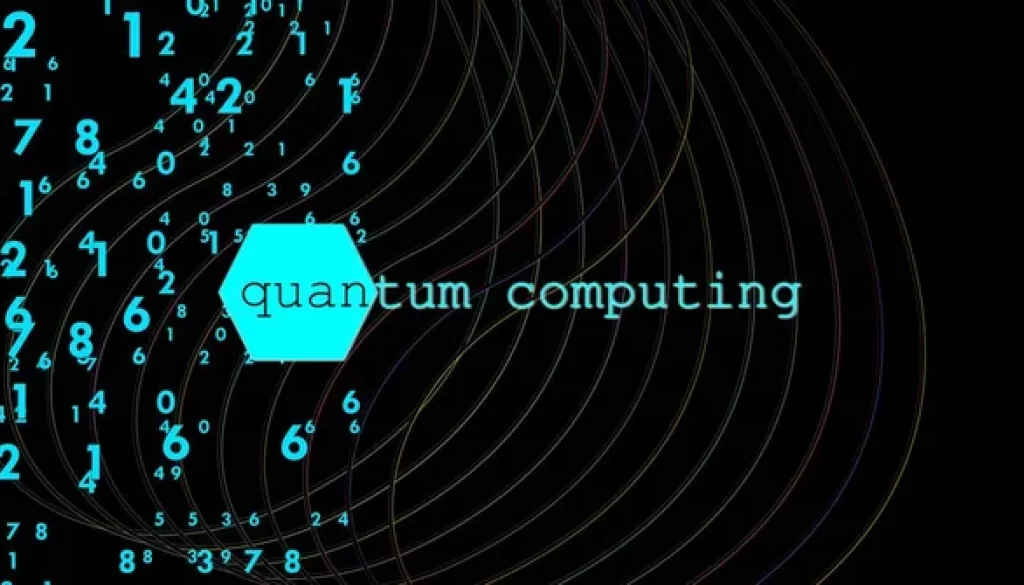What is Quantum Computing? A Breakthrough in Technology
Discover the Future of Computing: Explore ‘What is Quantum Computing?’ – A Game-Changing Breakthrough in Technology.
In recent times, the domain of technology has borne witness to a remarkable upheaval – the advent of quantum computing. This revolutionary progression has ensnared the imagination of scholars, engineers, and technology enthusiasts alike. As we plunge into the captivating realm of quantum computing, we unearth its complexities, potential utilities, and the pivotal role it assumes in shaping the trajectory of technological evolution.
Read about Cloud Computing: Cloud Computing: Powerfully Revolutionizing IT

The Quantum Leap: Understanding Quantum Computing
At its essence, quantum computing leverages the tenets of quantum mechanics to undertake computations that transcend the capacities of classical computers. Diverging from classical bits, which adhere to binary constraints of either 0 or 1, quantum bits, or qubits, can exist within a superposition of states. This unique attribute empowers them to process a prodigious volume of data in parallel.
Quantum Supremacy and Its Implications
A noteworthy milestone in the domain of quantum computing transpired when Google’s quantum apparatus, known as Sycamore, validated quantum supremacy. This term signifies the juncture at which a quantum computer surpasses the prowess of the most formidable classical computers in specific tasks. In Google’s case, Sycamore executed a formidable calculation within a mere 200 seconds, a feat that would necessitate thousands of years for classical supercomputers to accomplish.
This accomplishment marked an epochal pivot in the landscape of quantum computing, accentuating its colossal potential in resolving challenges that were hitherto deemed insurmountable. These challenges encompass simulating molecular structures for the purposes of drug discovery, optimizing logistical networks, and instigating a revolution in the domain of cryptography.
Read about Cybersecurity: What is Cybersecurity? Safeguarding Digital Frontier of Digital World
Quantum Entanglement: The Key to Quantum Computing
Quantum interdependence constitutes a phenomenon where the characteristics of two or more particles become interlinked in a manner such that the state of one particle instantaneously influences the state of another, irrespective of the spatial expanse that separates them. This unparalleled facet of quantum mechanics constitutes the bedrock of quantum computing’s efficacy.
Visualize a pair of interdependent qubits. Upon measuring one of them, you instantaneously discern the state of the other, regardless of the vast distances that may separate them. This attribute empowers quantum computers to execute intricate calculations involving interdependent qubits, offering a computational edge that classical computers cannot replicate.

Applications of Quantum Computing
Advancing Drug Discovery
The capacity of quantum computing to replicate molecular structures with unparalleled precision augments the potential of drug discovery substantially. The orthodox processes of drug development can be laborious and time-intensive, often spanning years in the quest to pinpoint prospective candidates. Quantum computers can expedite this process by forecasting molecular interactions with precision, thereby drastically curtailing the temporal requirements for drug discovery.
Within the sphere of drug discovery, researchers frequently confront the obstacle of emulating intricate molecular interactions. Classical computers grapple with the sheer profusion of variables implicated, rendering it arduous to predict the conduct of molecules accurately. This is precisely where the luminescence of quantum computing comes to the fore.
Quantum computers possess the dexterity to efficaciously model the conduct of molecules at the quantum level, factoring in all conceivable interactions and configurations. This granular level of analysis empowers researchers to identify potential drug candidates expeditiously and with augmented accuracy.
Transforming Cryptography
In the domain of cybersecurity, quantum computing begets both challenges and prospects. While quantum computers possess the potential to breach extant encryption methodologies, they can also be harnessed to cultivate encryption algorithms impervious to quantum threats. This paradigm shift in cryptography assumes paramount importance in securing sensitive information in the era of quantum proliferation.
Traditional cryptographic techniques, including RSA and ECC, hinge upon the complexity of factoring vast numbers or resolving discrete logarithmic conundrums. These predicaments, though presently formidable for classical computers, can be facilely unraveled by sufficiently potent quantum computers through algorithms such as Shor’s algorithm.
To counteract this looming threat, researchers are actively engendering quantum-resistant cryptographic algorithms. These algorithms pivot upon mathematical problems conjectured to remain formidable even in the face of quantum computational prowess. By transitioning to quantum-resistant encryption methods, institutions can insulate their data against potential quantum assaults.
Optimizing Complex Systems
Industries such as logistics and finance lean heavily on optimization algorithms to streamline operations and ameliorate cost-efficiency. The prodigious computational horsepower of quantum computing has the potential to revolutionize these industries by proffering real-time solutions to intricate optimization challenges, thereby engendering more streamlined supply chains and financial models.
In the realm of logistics, corporations confront the exigency of orchestrating the most efficient routes for their fleet of delivery vehicles, all the while factoring in variables like traffic congestion, meteorological conditions, and predefined delivery timeframes. Classical computers grapple with the conundrum of ascertaining optimal solutions within a reasonable timeframe when confronted with voluminous and intricate datasets.
Quantum computers, conversely, excel in unraveling optimization problems. They are adept at promptly scrutinizing myriad prospective solutions and identifying the most efficient routes, a feat that results in considerable savings of time and resources. This capability harbors the potential to transform the logistics domain, curtailing expenses and refining delivery timelines.
Overcoming Quantum Computing Challenges
Notwithstanding the astronomical promise that quantum computing holds, it is not devoid of its tribulations. Sustaining the stability of qubits, mitigating error rates, and scaling the quantum processing apparatus represent perpetual obstacles that researchers are ceaselessly endeavoring to surmount. These trials form the crucible wherein the full potential of quantum computing is to be realized.
Qubit Stability
Among the foremost challenges within the realm of quantum computing resides the onerous task of preserving the stability of qubits. Qubits evince a heightened susceptibility to extrinsic influences such as temperature fluctuations, electromagnetic radiation, and even cosmic rays. These environmental vagaries can precipitate the forfeiture of quantum attributes in qubits, thereby ushering in inaccuracies during computations.
Researchers are engrossed in the development of error rectification methodologies aimed at mitigating these predicaments. Quantum error correction entails encoding information in a manner that facilitates the detection and rectification of errors, akin to the principles underpinning classical error correction within digital communication. This approach is integral to the cultivation of reliable and utilitarian quantum computers.
Error Rates
Another considerable obstacle in the domain of quantum computing resides in the reduction of error rates. Qubits are predisposed to errors attributable to various factors, encompassing flawed hardware and environmental tumult. Elevated error rates can impart unreliability to quantum computations, thus circumscribing the applicability of quantum computers in practical settings.
To surmount this hurdle, researchers are laboring over the conceptions of error-mitigating codes and fault-tolerant quantum computation. These stratagems are engineered to minimize errors and ensure the veracity of quantum computations, consequently rendering quantum computers more dependable for real-world utilization.

Scaling Quantum Processors
The dimension of scalability is pivotal in unleashing the entire potential of quantum computing. Contemporary quantum computers bear the hallmark of being modestly scaled, typified by a restricted number of qubits. In the quest to address intricate challenges, researchers necessitate the substantial enlargement of quantum processing apparatus.
The amplification of quantum processors encompasses not only the augmentation in the count of qubits but also enhancements in their interconnectivity and cohesiveness. This constitutes a convoluted engineering conundrum, which demands innovations in the realms of hardware schematics, control systems, and error rectification.
The Future of Quantum Computing
The vista of quantum computing manifests itself as a terrain replete with prospects. As the technology matures, we can envisage quantum computers becoming more accessible, potentially revolutionizing myriad domains spanning healthcare to finance. Researchers and global institutions are collaboratively laboring towards the unearthing of the boundless potential intrinsic to this transformative technology.
Quantum Computing in Healthcare
Within the sphere of healthcare, quantum computing wields the potential to metamorphose drug discovery, genomics, and medical imaging. By replicating intricate biological systems at the quantum scale, researchers stand poised to glean unparalleled insights into maladies and potential remedies. This could usher in the development of highly precise treatments and bespoke medical solutions.
Quantum Computing in the Financial Sector
The financial industry stands to accrue substantial benefits from quantum computing. Quantum algorithms can optimize investment portfolios, prognosticate market trends with greater precision, and enhance risk management practices. Financial institutions are actively exploring the potential of quantum computing to gain a competitive edge within a dynamically evolving market.
Quantum Computing in Materials Science
Materials science represents yet another arena wherein quantum computing can exert a profound influence. Researchers can harness quantum simulations to unearth novel materials characterized by distinctive attributes, such as superconductors for efficient energy transmission or advanced materials tailored for aerospace applications. This could pave the way for innovations hitherto considered beyond the pale.
Quantum Computing Ethics and Security
The maturation of quantum computing simultaneously engenders ethical and security quandaries. Quantum computers harbor the capability to breach existing encryption methodologies, thereby imperiling data confidentiality and national security. It is, therefore, imperative for policymakers and institutions to promulgate quantum-resistant encryption benchmarks and cybersecurity stratagems to safeguard sensitive information.
Conclusion
In summation, quantum computing assumes pole position within the panorama of technological innovation, poised to redefine the confines of the attainable. Its potential to overhaul industries, expedite scientific breakthroughs, and reshape the world as we comprehend it is nothing short of extraordinary. As we traverse deeper into the quantum realm, one certainty crystallizes – the future is irrevocably quantum.

FAQS (Frequently Asked Questions)
- What is quantum computing? Quantum computing is a cutting-edge field of computing that utilizes the principles of quantum mechanics to perform computations. Unlike classical computers that use bits to represent 0s and 1s, quantum computers use quantum bits or qubits, which can exist in superpositions of states, allowing them to process vast amounts of information simultaneously.
- How does quantum computing differ from classical computing? Quantum computing differs from classical computing in terms of the fundamental units of information (bits vs. qubits) and the computational principles it employs. Quantum computers can solve certain problems exponentially faster than classical computers, particularly in areas like cryptography and complex simulations.
- What are the potential applications of quantum computing? Quantum computing has the potential to revolutionize various industries, including drug discovery, materials science, finance, cryptography, and optimization. It can accelerate simulations of molecular interactions, enhance encryption methods, and optimize complex systems like supply chains.
- Is quantum computing practical for everyday use? Quantum computing is still in its early stages, and large-scale, practical quantum computers are not yet widely available. However, research and development are ongoing, and in the future, quantum computing could become more accessible and find applications in various domains.
- What are the challenges in quantum computing? Quantum computing faces challenges such as maintaining qubit stability, reducing error rates, and scaling up quantum processors. Overcoming these technical hurdles is essential to realizing the full potential of quantum computing.
- Can quantum computers break current encryption methods? Quantum computers have the potential to break many of the encryption methods currently in use, such as RSA and ECC, through algorithms like Shor’s algorithm. This has led to the development of quantum-resistant encryption methods to protect data in the era of quantum computing.
- Are there any ethical concerns related to quantum computing? Yes, as quantum computing advances, it raises ethical and security concerns. The ability to break encryption could jeopardize data privacy and national security. Ethical considerations also include the responsible use of quantum computing in areas like artificial intelligence and cryptography.
- How can I learn more about quantum computing? You can explore online resources, enroll in courses or programs related to quantum computing, and follow developments in the field through research papers, news articles, and industry conferences. Additionally, there are quantum computing simulators and educational tools available for hands-on learning.
- When can we expect quantum computers to be widely accessible? The timeline for widespread accessibility of quantum computers is uncertain. It depends on advancements in technology and research. Some companies are already offering cloud-based quantum computing services, allowing users to access quantum computers remotely.
- What role does quantum computing play in scientific research? Quantum computing can significantly expedite scientific research by simulating complex systems, predicting molecular behaviors, and solving intricate mathematical problems. It has the potential to accelerate discoveries in fields like chemistry, physics, and biology.
MCQs (Multiple Choice Questions)
- What is a qubit in quantum computing? A) A quantum computer manufacturer
B) A quantum programming language
C) A quantum bit, the fundamental unit of quantum information
D) A quantum encryption method Answer: C) A quantum bit, the fundamental unit of quantum information - How do quantum bits (qubits) differ from classical bits? A) Qubits are larger in size
B) Qubits can represent both 0 and 1 simultaneously
C) Qubits are slower than classical bits
D) Qubits are immune to errors Answer: B) Qubits can represent both 0 and 1 simultaneously - Which field of science forms the foundation of quantum computing? A) Biology
B) Classical mechanics
C) Quantum mechanics
D) Chemistry Answer: C) Quantum mechanics - What is the term for the point at which a quantum computer outperforms classical computers in specific tasks? A) Quantum advantage
B) Quantum leap
C) Quantum supremacy
D) Quantum excellence Answer: C) Quantum supremacy - In which industry does quantum computing offer the potential to optimize investment portfolios and improve risk management? A) Healthcare
B) Finance
C) Transportation
D) Agriculture Answer: B) Finance - What challenge in quantum computing involves minimizing errors caused by factors like imperfect hardware and environmental noise? A) Qubit stability
B) Error correction
C) Scaling up quantum processors
D) Quantum interdependence Answer: B) Error correction - Which encryption method is vulnerable to quantum attacks and requires the development of quantum-resistant alternatives? A) AES
B) RSA
C) DES
D) SSL Answer: B) RSA - What is the primary advantage of quantum computing in drug discovery? A) Faster internet connections
B) Enhanced virtual reality simulations
C) Accelerated prediction of molecular interactions
D) Improved smartphone battery life Answer: C) Accelerated prediction of molecular interactions - What is the term for the phenomenon where the state of one quantum particle instantly influences the state of another, regardless of distance? A) Quantum leap
B) Quantum entanglement
C) Quantum convergence
D) Quantum interference Answer: B) Quantum entanglement - What role does quantum computing play in materials science? A) Analyzing historical data
B) Predicting market trends
C) Simulating new materials with unique properties
D) Enhancing cybersecurity Answer: C) Simulating new materials with unique properties
Additional Links
- IBM Quantum Experience: IBM’s official website offers access to a cloud-based quantum computer and provides educational resources, tutorials, and news on quantum computing advancements. IBM Quantum Experience
- Quantum Computing Report: This website offers news, articles, and in-depth analysis of the quantum computing industry, including updates on quantum hardware, software, and applications. Quantum Computing Report
- Microsoft Quantum: Microsoft’s quantum computing page provides information on their quantum development kit, quantum programming languages, and educational resources for learning quantum computing. Microsoft Quantum
- Quantum Magazine: A publication dedicated to covering the latest developments and research in the field of quantum computing and quantum physics. Quantum Magazine
- Quantum Computing Stack Exchange: This community-driven platform allows users to ask questions and find answers related to quantum computing. It’s a great place to engage with experts and enthusiasts in the field. Quantum Computing Stack Exchange
- Quantum Algorithms and Applications: This resource from the University of Bristol offers tutorials and information on quantum algorithms and their potential applications. Quantum Algorithms and Applications
- Quantum Computing for the Very Curious: A comprehensive and free online book that covers the fundamentals of quantum computing in an accessible way. Quantum Computing for the Very Curious
- The Quantum AI Foundation: An organization dedicated to advancing quantum computing and artificial intelligence. Their website provides resources and updates on quantum AI research. The Quantum AI Foundation



